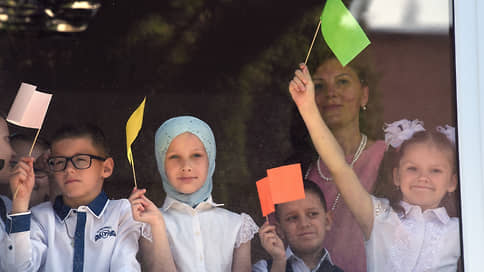The hijab is allowed before the lessons
[ad_1]

The Ingush deputies decided to legislate the right of Muslim women to wear the hijab in educational institutions. A relevant bill has been prepared in the regional parliament, which received unanimous support and will soon be submitted to the State Duma. Regional legislators are counting on the support of their federal colleagues, believing that “wearing a Muslim headscarf anywhere is an integral part of the constitutionally guaranteed right of Russian citizens to freedom of religion.” Now the dress code of students is determined by the heads of schools and universities.
The Parliament of Ingushetia will submit a draft law to the State Duma of the Russian Federation, which will secure the right of students to wear clothes in educational institutions that correspond to their folk traditions and religion. “At a regular meeting of the parliament, a draft federal law “On Amendments to Article 38 of the Federal Law “On Education in the Russian Federation”” was considered,” the Ingushetian parliament reports. Republican parliamentarians believe that when developing requirements for the uniform in educational organizations, state bodies are obliged to take into account the constitutional right of students to wear clothes taking into account folk traditions and religion, and not leave this issue to the discretion of educational organizations. As Aza Khashiyeva, vice-speaker of the parliament of Ingushetia, who presented the bill to her colleagues, told Kommersant, the idea of developing it arose in connection with the numerous appeals of Muslim women for prohibitions to appear in educational institutions in headscarves. “In our republic, of course, there are no such problems and cannot be,” our countrywomen who live in other regions of Russia complained, Ms. Khashiyeva explained. She also believes that the right to dress in accordance with the requirements of religion and folk tradition is part of the right of citizens to freedom of religion guaranteed by the Russian Constitution, and it must be respected regardless of where a person lives. The deputy notes that in Russia there is no law that would prohibit the wearing of a Muslim headscarf in schools or universities, but there is a provision in the federal law on education that allows heads of educational institutions to set a dress code for students at their discretion. “This right is abused in some regions, forbidding Muslim women to come to classes with their heads covered,” the vice speaker complained.
It should be noted that in 2012 the government of the Stavropol Territory, neighboring Ingushetia, adopted a resolution on the introduction of a single form in Stavropol schools. Under the new rules, girls were banned from wearing head coverings in class, including hijabs. The reason for the adoption of the law was the story when one of the schools in the region refused to let the students wear hijabs to the lessons. Then the position of the school administration, despite the indignation of the parents of the students, was supported by the authorities of the region. The parents of Muslim girls tried to challenge the decision of the Stavropol authorities in the courts. However, first the regional court, and then the Supreme Court of Russia, refused to satisfy the claim. A similar story happened not so long ago in the city of Novocherkassk: as Kommersant told, the leadership of the local medical college expelled five Muslim students due to their refusal to change Muslim headscarves for medical hats. The management of the educational institution considered such a refusal to be a violation of the internal regulations. The students, their representatives say, intend to appeal the expulsion in court if they fail to reach a compromise with the administration. In turn, the Ministry of Health of the Russian Federation, commenting on the situation, recalled that, according to the law, an educational institution has the right to independently establish requirements for students’ clothing, including general appearance, color and style.
Lawyer Murad Musaev, who represented the interests of Muslim women in courts where hijab cases were considered, considers the initiative of the Ingush deputies deserving close attention. “The bill is, of course, an attempt to solve the notorious problem of the hijab, the national costume is mentioned here rather for beauty,” Mr. Musaev is convinced. He also holds the view that the ban on the hijab, no matter who and where it is established, restricts freedom of religion: “At school, in the theater, on the street, it doesn’t matter, this ban violates the right guaranteed by the Constitution of Russia, the human right to then to live according to his religion.”
[ad_2]
Source link








